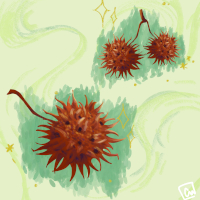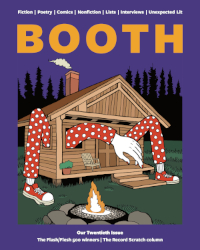Nonfiction by Mike Smith of Albuquerque
First the static, gray and white and endlessly in motion, dynamic and flat, so much going on with maybe no work from anyone. It’s just the tops of trees in early winter, the ends of branches thrashing in a windstorm. A cloud of gnats. The gray of the water of a restless lake, and it’s a cloudy day, and there’s rain on the water, and the drops explode the water’s surface, and that’s it.
My mom stands at the stove of our old house—2152 East Golf Avenue, Tempe, Arizona. It’s April 1979, and my dad says, “Let’s see, hon, turn sideways,” and my mom, in a bright-red button-up shirt, turns away from a pot on the stove, laughing, smiling even before she turns, pregnant, pregnant with me. Somehow, I am a part of this, unseen, upside down and folded up, afloat in electrolytes and protein and another being, four months from nothing, five from a name, able to blink and pump blood, translucent and veined, shrouded in a dim-glowing darkness.
One month old, and I’m me. October 1979, and I am a crying baby, crying just a little. Grandma Bang, my mom’s mom, is visiting, and says, “Michael! Oh, don’t cry, sweetheart,” and kisses me. My mom washes my hair in the kitchen sink, pouring water onto me from a cup.
13.8 billion years before this, at the advent of time and space, everything, literally everything, all the matter and energy that somehow exist, finds itself compressed into a point. Everything so hot and dense. Everything shaking from what it contains. Shaking from what it is.
#
Static at the ends and beginnings of all these tapes. Sunlight shattering over ocean waves, skittering down like spiders of light. A landfill in an earthquake. Water boiling, sure to boil over.
It’s late 1980, and I’m one, and in the backyard, waving a little American flag and saying, “Whoa oh, whoa oh, whoa oh,” which is what a flag says. I run toward a gray-and-white cat, Whiskers. My brother Rob, with one arm in a sling, picks up the cat and chases me. “He’s going to kiss you!” he says. I find a stick and hit a red wagon with it, repeatedly, for several minutes.
September 24, 1981, and there’s a party for my second birthday. There’s a lamp beside me made of cattails. The table is covered in presents—there’s a plastic TV with a carrying handle, a stuffed tiger, books, another plastic box with a handle. There are people in the dark on every side. There’s a round cake with two candles on it, and I’m leaning over it, excited and smiling, and I’m taking a break to hug Fred, the dog, who I love. Loud, louder than any words, is the music, one of the Brandenburg Concertos, dubbed over everything, holding all of us in.
A question that could be asked of any scene, or of any story, is, “What led up to that?” And an answer that could always be given is, “Everything.” Here, everything is in one place. Literally everything in one place. A place so densely packed, so hot, so abuzz with potential, eventually it can only explode, can only move outward, and it does. The Big Bang, although initially it doesn’t bang at all, or sound like anything, as sound can’t and doesn’t yet exist. Here: It begins.
#
More static. And then more static. In a moment, some things will emerge.
My older brother, David, ten years old, jumps on our backyard trampoline, in 1983, playing “It’s a Small World After All” on a trumpet, badly. I’m jumping, too, four years old. My sister Julie, a teenager with feathered bangs, watches from a concrete-block wall, laughing with her friends.
Now four years old, with evidence of billions of years more all around. The Grand Canyon. Sunset. 1983. At my feet, a mile-deep rock chasm. A sky even deeper and older pushing down into it. My oldest sister, LeeAnne, seventeen, alive and laughing, stands at a guardrail. Near her are three Indian women, in sarongs, red bindi dots on their foreheads, their hair in buns. They are visiting LeeAnne from Bombay, India, where she stayed with them as an exchange student.
They disregard the camera, looking silently over the hazy levels of the canyon. The wind blows, the sun burns a notch into the canyon’s opposite rim, and I am jumping around, excited, begging to go down, my voice muted by the vastness. LeeAnne, my mom, and my brother David walk away from the edge. LeeAnne waves. The tape ends, rewinds itself, and begins to play again.
The Big Bang, because this is about origins. The Big Bang, because our origins are knowable, unknowable, and will be revised. The Big Bang, because there’s just one story, the story of everything. Every story, yours and mine, is an infinitesimal part of that, and not one part is extra.
#
13.8 billion years ago, it happened, and it’s still happening. The universe expanded, suddenly, and the universe is expanding still. We’re in it. Turn on an old TV, and the static hushes and churns and roils its way into our homes, and part of that static is the Big Bang itself, its cosmic background radiation, the evidence and erasure of what we were, of what we remain.
Then, the desert, still 1983, and my brother Matt is about to jump from a plane. My mom holds my younger brother, Jeffy, a baby in a blanket. I walk behind my mom, hesitantly, away from a small plane. I smile and watch. Matt puts on a helmet and a parachute pack. He climbs into the plane, and it taxis away and takes off and flies toward a range of bare stone mountains. Minutes pass in an instant, the plane turns black and shrinks, and a parachute blooms in the distant sky.
My brother, Jeffy, blond and two years old, sits covered in kittens, in 1984, on the green Astroturf of the back porch. Beside him sits a cardboard box, the kittens’ bed. My mom’s voice says, “Put ’em in,” and Jeffy does. Lovingly, one by one, he picks up the kittens, by a tail, or a back leg, and hurls them into the box. One tries to crawl away but is snatched up and affectionately flung toward the others, mewing. My mom tries not to laugh, but laughs.
It happened so long ago, yet here is the proof. It’s all around us. It’s everywhere. Here are the patterns of heat and radiation still left over from the initial phenomenon. Here are the galaxies, laid out precisely along those patterns’ cooler lines. Here are the stars, and the galaxies again, still moving outward and apart. Here is the temperature of the remaining radiation, exactly as predicted. Here is the chemical makeup of the universe, just what we thought we would find.
#
Before all that, another tape. It’s 1977, and the family appears complete, on a quiet gray road, in Arizona. Heat corkscrews up into the air from the bleached-gray pavement. The family’s large tan van sits nearby, and there are my parents, though not yet my parents. The sky is coarse and grainy, blue and white and gray and fizzing. The film behind them hisses and hushes, roars. The sky moves over everything, just keeps happening, holds everyone in, in a pale blue nebula.
My five extant siblings are there—but they are not my siblings—they are only one another’s— I’m not there. My mom and my older brother Matt, an athletic teenager, have just finished running a race on this paved desert highway, and they have paper numbers pinned to their shirts. The whole family is there, and my mom’s brother is there, and everyone is smiling, talking, congratulating. They are a genuinely happy family, and none of this has anything to do with me.
I don’t exist yet, though my atoms may be everywhere—in the air between people, in the water beneath the desert, in the few clouds in the sky, in the food in a cooler in the van—soon to be part of my parents, and then a part of me. Elements that were formed by the Big Bang, clumped together, pulled into a molecular cloud, collapsed into a ghostly column of dust and gas, fitted together into atoms, into atoms that would later be you, me, everyone, Earth—they’re there.
I am not waiting to come together, but I will come together. I am not waiting to have an origin, or to go out from it, but I will have an origin, and I will go out. Everything is not leading up to me, but it will lead up to me, among other things. I will come from an unknowable cloud. I will never know the cloud. I will come from a churning field. And then, the picture will resolve.



